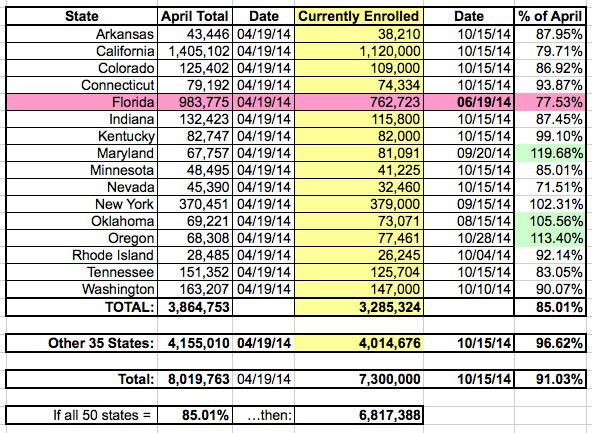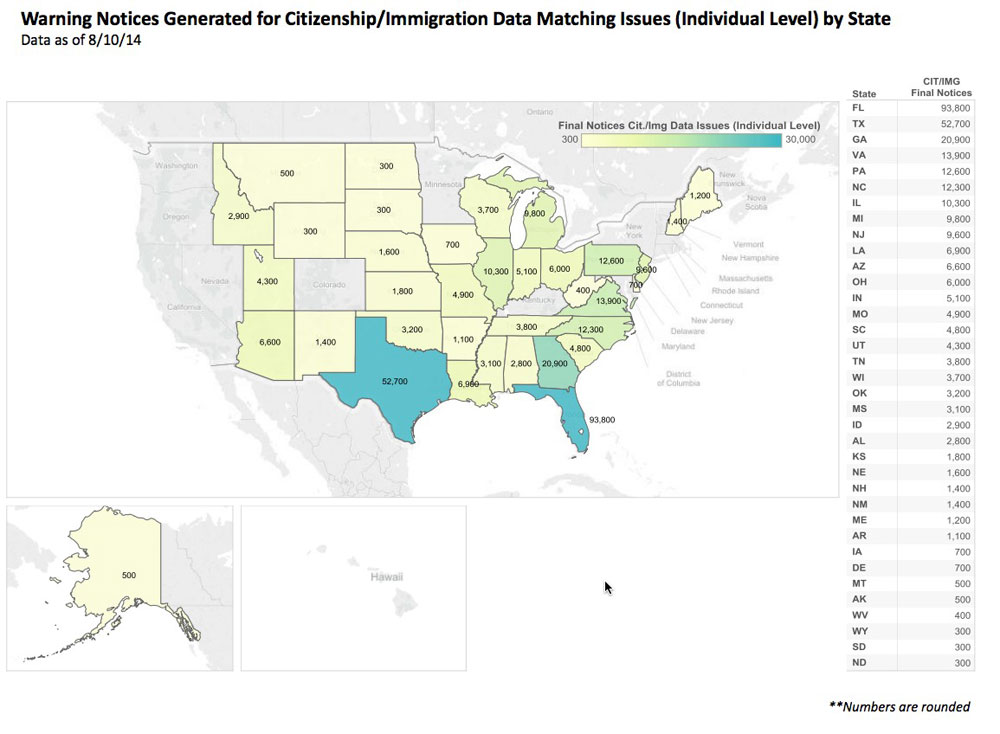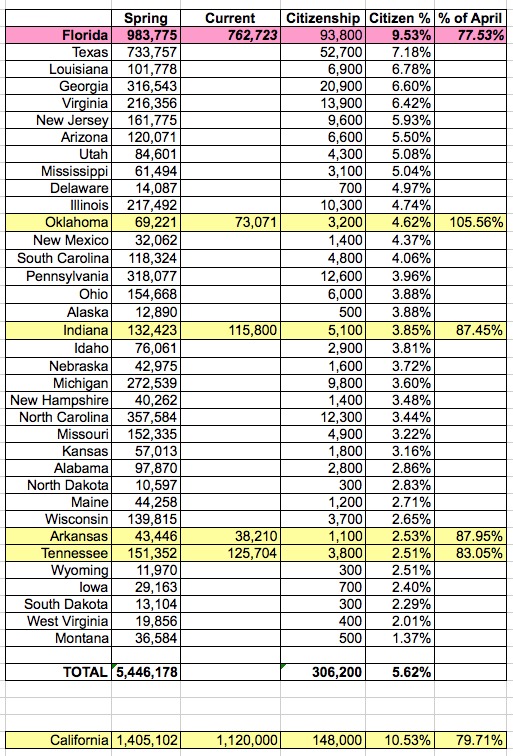What's the Matter with Florida?
Yesterday, in my Big Exclusive Post® about the number of people currently enrolled in exchange QHPs appearing to have dropped down to a bit below 7 million, I noted that based on the 15 states for which I have current enrollment data from September or October (plus 1, Oklahoma, from August), it looks like the national total is right around 7 million on the nose at the moment. However, if you throw Florida into the mix, it drops noticeably, making it look more like 6.8 million.
I also noted that there are two problems with the Florida data: First, that it's had significantly more dropoff (22.5%) from the official April figure than any of the other states listed (with the exception of Nevada, which has had its own technical headaches to the point that it's dropping its exchange entirely).
Even more problematic is that this 22.5% "drop" was supposedly only as of June 30th (it comes from Florida's 2015 policy rate request filing report from the insurance companies operating on the federal exchange).
This makes Florida an incredible outlier; take another look at the chart:

It's been bugging the heck out of me. California isn't that much higher, but that's as of October, not June. Nevada I noted above. None of the other states are anywhere close to this level of attrition, and again, those are as of September or October, not way back in June (only 1 1/2 months after the first open enrollment period ended, I should note).
Possible reasons for the discrepancy may include FL having a higher-than-typical number of 64 year olds (who would have turned 65 and moved over to Medicare over the past year, naturally); serious clerical/reporting errors on the part of the exchange (except that FL operates on the federal exchange with 35 other states, and there doesn't seem to have been significant drop-off anywhere else, at least not as of the end of June), and so on...but none of these seemed to explain more than a small portion of the difference.
Then, yesterday, Larry Levitt of the Kaiser Family Foundation made an excellent observation about the "immigration/citizenship data" issue which I've discussed a couple of times earlier this fall: Florida has by far the highest number of enrollees with these issues in the country (outside of California, which I'll discuss below). He sent me a link to the following handy PDF from the HHS Dept. website:

I know the numbers are hard to read, so I've plugged them into a more complete chart, comparing the number of enrollees through the federal exchange who the HHS Dept. generated "warning notices" for back in August versus the total official enrollment numbers from April 19th:

As you can see, a whopping 9.5% of the 983K Floridians who enrolled through April were flagged as having problems with their citizenship/immigration data. None of the other states for which I have current enrollment data had more than 4.6% due in part, of course, to them having a far lower percentage of immigrants in the first place. Levitt's conclusion is that since FL has a higher percentage of citizenship data issues, that's likely a large part of the reason for their drop-off.
However, there's a few problems with this theory. First of all, those "warning notices" weren't sent out until August, and no one was actually dropped from their policies by HHS due to immigration issues until the end of September...yet Florida's huge drop was reported way back in June.
Secondly, look at California. I wrote up an entire article over at healthinsurance.org about California's own immigration/citizenship data issues...and in their case, out of over 148,000 enrollees who originally had problems, only 7% ended up actually having their policies cancelled in the end (87% were resolved without cancellation; another 6% awere still under review at that time).
I assumed that if California only had to cancel 10K out of 148K, the odds are that there would be only another 10-20K cancelled for these reasons nationally, since the actual number of people sent final notices by HHS ended up being only 115K. The above "warning notice" link makes it sound like there were another 191,000 who had been sent an earlier warning, but assuming the same ratio, that should still only bring the total number cancelled for citizenship issues to perhaps 50,000 or so nationally.
In addition, since California operates its own ACA exchange, it's possible that CoveredCA's data collection/citizenship status verification process is more advanced than Healthcare.Gov's. Perhaps comparing 148K via CoveredCA against 115K (or even 306K) via HHS isn't reasonable...but I still find it difficult to believe that a significantly higher percentage of Florida's enrollees were dropped for this reason than California's.
Still, the "Florida has a lot of immigrants" theory may explain at least part of FL's attrition figures. Unfortunately, take a look at the chart above and you'll note that I don't have any current/recent data for the next 10 states on the list, including Big States like Texas and Georgia.
In short, if the immigration/citizenship data issue is a major factor after all, then the current enrollee number might be lower than 6.8 million...but that's still impossible to tell with the data at hand. The absolute worst-case theoretical scenario here would be if every single one of the 199K people shown in non-highlighted states above has been dropped, which is ludicrous--there's no reason why a higher percentage of immigrants in Texas or Georgia would be likely to have data discrepancies than in Florida.
So...I'm standing by my estimate of 6.8 - 7.0 million current enrollees until further data presents itself.
Of course, all this tea leaf reading could be cleared up if HHS would actually give out that data (or at least explain why they won't).
How to support my healthcare wonkery:
1. Donate via ActBlue or PayPal
2. Subscribe via Substack.
3. Subscribe via Patreon.



